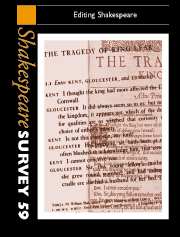Book contents
- Frontmatter
- Editing Shakespeare’s Plays in the Twentieth Century
- Crisis in Editing?
- On Being a General Editor
- Altering the Letter of Twelfth Night: ‘Some are born great’ and the Missing Signature
- ‘A Thousand Shylocks’: Orson Welles and The Merchant of Venice
- The Date and Authorship of Hand D’s Contribution to Sir Thomas More: Evidence from ‘Literature Online’
- Ferdinand’s Wife and Prospero’s Wise
- Editing Stefano’s Book
- Manuscript, Print and the Authentic Shakespeare: The Ireland Forgeries Again
- The Author, the Editor and the Translator: William Shakespeare, Alexander Chalmers and Sándor Petofi or the Nature of a Romantic Edition
- Women Edit Shakespeare
- The Shakespeare Edition in Industrial Capitalism
- Print and Electronic Editions Inspired by the New Variorum Hamlet Project
- The Evolution of Online Editing: Where Will it End?
- The Director as Shakespeare Editor
- The Editor as Translator
- Performance Editions, Editing and Editors
- Editing Collaborative Drama
- Will in the Universe: Shakespeare’s Sonnets, Plato’s Symposium, Alchemy and Renaissance Neoplatonism
- Giants and Enemies of God: The Relationship between Caliban and Prospero from the Perspective of Insular Literary Tradition
- Shakespeare’s Ages
- Who Wrote William Basse’s ‘Elegy on Shakespeare’?: Rediscovering a Poem Lost from the Donne Canon
- ‘Sometime a Paradox’: Shakespeare, Diderot and the Problem of Character
- Shakespeare Performances in England, 2005
- Professional Shakespeare Productions in the British Isles, January–December 2004
- The Year's Contributions to Shakespearian Study 1 Critical Studies
- 2 Shakespeare in Performance
- 3 Editions and Textual Studies
- Index
Editing Collaborative Drama
Published online by Cambridge University Press: 28 March 2007
- Frontmatter
- Editing Shakespeare’s Plays in the Twentieth Century
- Crisis in Editing?
- On Being a General Editor
- Altering the Letter of Twelfth Night: ‘Some are born great’ and the Missing Signature
- ‘A Thousand Shylocks’: Orson Welles and The Merchant of Venice
- The Date and Authorship of Hand D’s Contribution to Sir Thomas More: Evidence from ‘Literature Online’
- Ferdinand’s Wife and Prospero’s Wise
- Editing Stefano’s Book
- Manuscript, Print and the Authentic Shakespeare: The Ireland Forgeries Again
- The Author, the Editor and the Translator: William Shakespeare, Alexander Chalmers and Sándor Petofi or the Nature of a Romantic Edition
- Women Edit Shakespeare
- The Shakespeare Edition in Industrial Capitalism
- Print and Electronic Editions Inspired by the New Variorum Hamlet Project
- The Evolution of Online Editing: Where Will it End?
- The Director as Shakespeare Editor
- The Editor as Translator
- Performance Editions, Editing and Editors
- Editing Collaborative Drama
- Will in the Universe: Shakespeare’s Sonnets, Plato’s Symposium, Alchemy and Renaissance Neoplatonism
- Giants and Enemies of God: The Relationship between Caliban and Prospero from the Perspective of Insular Literary Tradition
- Shakespeare’s Ages
- Who Wrote William Basse’s ‘Elegy on Shakespeare’?: Rediscovering a Poem Lost from the Donne Canon
- ‘Sometime a Paradox’: Shakespeare, Diderot and the Problem of Character
- Shakespeare Performances in England, 2005
- Professional Shakespeare Productions in the British Isles, January–December 2004
- The Year's Contributions to Shakespearian Study 1 Critical Studies
- 2 Shakespeare in Performance
- 3 Editions and Textual Studies
- Index
Summary
He was delated by Sr James Murray to the King for writting something against the Scots jn a play Eastward hoe & voluntarly Imprissonned himself wt Chapman and Marston, who had written it amongst ym
Jonson, Conversations with DrummondNo reading of the play can be satisfactory that does not also take account of its remarkable imaginative unity.
Lois Potter, Introduction to The Two Noble KinsmenI have become, apparently, a specialist, if not an expert, on editing collaboratively written drama. Although I profess surprise, the path is not really difficult to trace. I began my professional life writing on Beaumont and Fletcher for G. E. Bentley; I was soon editing; and, as many scholars, usually citing Bentley, have reiterated, the majority of early modern plays were collaboratively written. Ergo, to edit, logically enough, is to edit collaboration.
But no, not for most people, or at least not willingly. Most scholars want to edit Jonson, not Eastward Ho!, Middleton, not A Fair Quarrel, Shakespeare, not Pericles. Although I was flattered when Gary Taylor asked me to write the Introduction to The Spanish Gypsy for the Oxford Collected Middleton, perhaps no one else was foolish enough to undertake 5,000 words on a play whose 1653 title-page names Middleton and Rowley as the authors but which has been convincingly attributed primarily to Ford and Dekker. And now I find myself, in a satisfying return to origins, editing Philaster. Partly on the basis of my own editing experience, but also because as a General Editor of Arden Early Modern Drama, I, and my co-General Editors John Jowett and Gordon McMullan, have been faced with the complications that arise in the collaborative editing of collaborations, I will here offer a meditation on the practical consequences, for the real and lonely editor, of the mantra we all now repeat.
- Type
- Chapter
- Information
- Shakespeare Survey , pp. 213 - 224Publisher: Cambridge University PressPrint publication year: 2006
- 1
- Cited by



